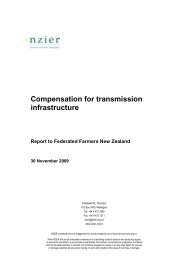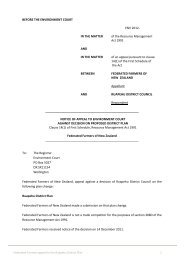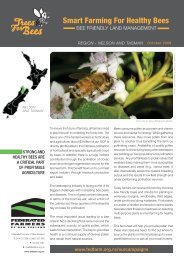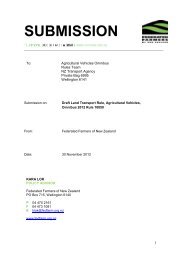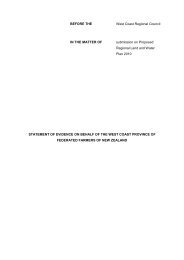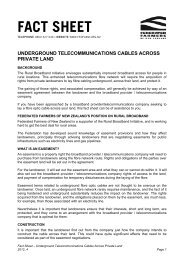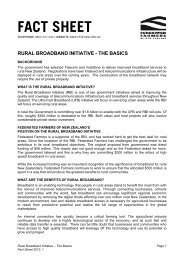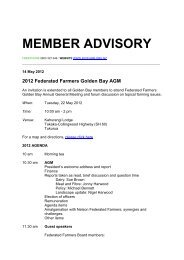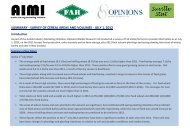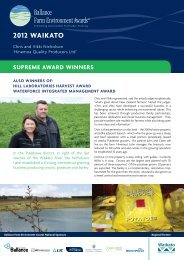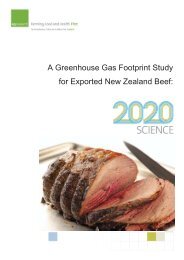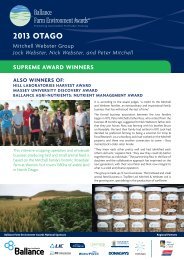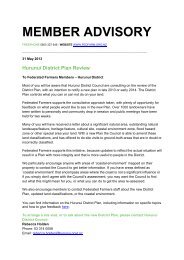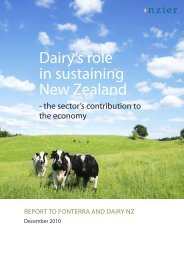here - Hill Laboratories
here - Hill Laboratories
here - Hill Laboratories
Create successful ePaper yourself
Turn your PDF publications into a flip-book with our unique Google optimized e-Paper software.
2013 HORIZONS<br />
Curwen and Marija Hare<br />
Tuatahi Farm Partnership<br />
SUPREME AWARD WINNERS<br />
ALSO WINNERS OF:<br />
BEEF + LAMB NEW ZEALAND LIVESTOCK FARM AWARD<br />
and WATERFORCE INTEGRATED MANAGEMENT AWARD<br />
The Hares possess what the award judges<br />
described as “an impressive, balanced approach”<br />
to farming their 275ha (230ha effective) Waituna<br />
West hill country property.<br />
Ballance Farm Environment Awards National Sponsors<br />
The judges commended the couple’s use of expert knowledge<br />
to steer their business through the restraints of debt loading (a<br />
legacy of land purchase at a high in the early 1980s) and their<br />
property’s natural limitations due to contour, varied and some<br />
heavy wet soils, limited natural water, and exposure to wind<br />
“from all directions”.<br />
In the past five years the Hares have reduced debt by downsizing<br />
to one farm, and adopted a Horizons Regional Council sustainable<br />
land use initiative plan (SLUI) for their property. These changes,<br />
after farming on land that had been in the Hare family for 113<br />
years, have heralded a significant shift in approach for Curwen,<br />
but he’s happy with the transformation.<br />
“It is having a major effect on our philosophy and how we<br />
are running the farm,” says Curwen, who is enjoying the more<br />
manageable debt level, the focus on just one farm and having<br />
the SLUI plan at hand. The plan advises of soil types and land<br />
use capabilities. Noted the judges: “This is an excellent example<br />
of adapting outside knowledge to maximise production and<br />
manage within some considerable natural limitations, without<br />
having a detrimental effect on the environment.”<br />
Regional Partner
Curwen and Marija Hare<br />
Tuatahi Farm Partnership<br />
SUPREME AWARD WINNERS (continued)<br />
The Hares’ property ‘Ewanrigg’ sits in the watershed between<br />
the Manawatu and Rangitikei catchments, north of Feilding.<br />
Last year the farm wintered 1050 ewes, 350 hoggets and 200<br />
dairy heifer grazers. Contour ranges between flat to moderately<br />
steep; height is up to 430m ASL. “The views are great, but we<br />
are quite exposed. It doesn’t matter which direction the wind<br />
blows from we get it,” says Curwen.<br />
Ewanrigg was purchased by the Hare family’s Tuatahi Farm<br />
Partnership (including Curwen’s parents) in 1982 to complement<br />
the neighbouring property, which Curwen’s grandfather came<br />
to in 1894. Six years ago the heart-wrenching decision was<br />
made to sell the original property ‘Tuatahi’ and keep Ewanrigg<br />
“because we felt this place had more scope”.<br />
When the Hares bought the farm t<strong>here</strong> were only 13 paddocks,<br />
including an 80ha block divided by three steep gorges. Now<br />
t<strong>here</strong> are 43 main paddocks. The steep areas account for about<br />
25 percent of the farm area. Using the SLUI plan information,<br />
JUDGES’ COMMENTS<br />
seven kilometres of fencing around these gorges was completed<br />
last summer. “It was all hard fencing, a major undertaking, but<br />
worth it,” says Curwen.<br />
They are part of the council’s possum eradication programme;<br />
regeneration is already occurring and these areas are in the<br />
process of being QEII covenanted. Nearly 12 percent of Ewanrigg<br />
is now fenced and retired, including all the permanently flowing<br />
streams on the property. “We are doing what we feel is right,”<br />
says Curwen. “Hopefully we are making a difference, and it is<br />
sustainable.”<br />
All stock water on Ewanrigg is supplied by a two dam system.<br />
Noted the judges: “Natural water isn’t abundant on the<br />
property and the water that is available is very well managed in<br />
terms of quantity and quality.” About two thirds of the farm is<br />
gravity fed from the dams. A solar powered system pumps the<br />
other third but has the capacity to water the whole farm in a<br />
dry season such as this.<br />
The couple embrace the sustainable farming concept that they<br />
point out the information provided by the SLUI plan allows them<br />
to pursue. “We are <strong>here</strong> for such a short time,” says Curwen,<br />
“so what we do as farmers should be able to be carried on in<br />
perpetuity, otherwise it’s not sustainable is it?”<br />
Curwen candidly admits they probably wouldn’t have looked<br />
at applying for a SLUI plan if it hadn’t been suggested to them<br />
as part of their role as a Beef + Lamb monitor farm in 2008. In<br />
the 2004 storm, which was the prompt for the SLUI, Ewanrigg<br />
escaped relatively unscathed. “But I’m rather glad we did (adopt<br />
the SLUI). It’s been a bit of a revelation.”<br />
Curwen and Marija have three adult sons, Tim, Richard and<br />
David.<br />
•<br />
The strength of this entry is the sound knowledge and commitment to detail of Curwen and Marija.<br />
•<br />
High producing, mixed pastures (including chicory, plantain) introduced to maximise weight gains in lambs and contract grazed cattle.<br />
•<br />
Excellent riparian management and planting, stock production and grazing management; understands w<strong>here</strong> to strive for improvements.<br />
Maximising use of water resource; use of solar power to drive pumps
Richard and Rachel Steele<br />
Retaruke Station<br />
MASSEY UNIVERSITY DISCOVERY AWARD<br />
MERIDIAN ENERGY EXCELLENCE AWARD<br />
JUDGES’ COMMENTS<br />
In an isolated area,<br />
w<strong>here</strong> the Wanganui and<br />
Retaruke Rivers converge,<br />
and adjacent to the<br />
Whanganui National Park,<br />
the Steeles operate their<br />
1441ha predominantly<br />
steep hill country property<br />
with “vision and passion”,<br />
according to the award<br />
judges.<br />
This active couple, whose three adult children are involved in<br />
the property “on a daily basis”, are successfully combining living<br />
and farming at Whakahoro with generating income from other<br />
ventures including adventure tourism, roading contracting and<br />
manuka honey partnerships.<br />
The judges wrote: “A key strength is the collaborative and<br />
innovative manner the family and staff work together to make<br />
the diverse but complementary businesses work.” Conservation<br />
and environmental considerations come first, “hands down”, says<br />
Richard. “In 100 years you won’t be known for being great sheep<br />
farmers, but what you did for conservation counts forever.” The<br />
couple say they are driven by the admiration they had, in their<br />
younger years, for “the optimism of old people planting trees”.<br />
The Steeles have given Richard’s sister Rosemary land on which<br />
an off-the-energy-grid home has been built. Rosemary moved<br />
from Auckland and it “made sense” says Richard to build with<br />
energy efficiency a priority. “The lines charges (for electricity)<br />
out <strong>here</strong> are getting out of hand. At our place we have the fire<br />
burning almost all year for hot water and cooking, t<strong>here</strong>’s no<br />
shortage of firewood!”<br />
The 7500su farm is a base for their jet boat tours and flying fox<br />
operation. Converted shearing quarters on the place form part<br />
of son Dan’s Blue Duck Lodge eco-tourism and farming business<br />
on an adjoining property. The Steeles enjoy that, between their<br />
place and the Blue Duck operation, 18 people are employed.<br />
“It’s not like living on a farm in the boonies,” says Richard with<br />
a smile, “it’s an exciting and vibrant place to be, even for an old<br />
fella like me.”<br />
Son Rich, who his Dad proudly explains, “can fix anything and<br />
build anything” shares his work between Retaruke and Blue Duck.<br />
Daughter Anna, an accountant in Taumarunui, is home three<br />
nights a week; her input to website and business administration<br />
is “invaluable” say her parents.<br />
The Steeles came to the area, an hour south of Taumarunui, in<br />
1993 when they purchased the original 830ha Retaruke Station.<br />
In 2005 they bought the 611ha property next door. 150ha is in a<br />
forestry partnership w<strong>here</strong> redwoods are planted in headwaters,<br />
to mitigate a massive earthflow movement. They have retired<br />
80ha of regenerating native bush and placed 119ha of mature<br />
native bush under QE II covenant. This latter area contains<br />
remnants of massive rimu, matai and kahikatea illegally logged<br />
prior to Steele ownership. This bush does still have some large<br />
trees standing however. Experts estimate some of the living<br />
kahikatea to be 890 years old.<br />
•<br />
Early realisation it was uneconomic to farm parts of the property; excellent management of riparian and native areas.<br />
•<br />
Maximum use of firewood sourced on the farm for renewable energy; water supply pumped by hydraulic ram.<br />
•<br />
Impressive integrated farming enterprise in conjunction with adventure tourism.<br />
Helped develop a dwelling on farm independent of off-site energy, with view to doing more.
Ross Collier<br />
Pentwyn Farms<br />
BALLANCE AGRI-NUTRIENTS: NUTRIENT MANAGEMENT AWARD<br />
HILL LABORATORIES HARVEST AWARD<br />
Ross operates his contracting business and farms<br />
at Rangiwaea with an understanding of land and<br />
soil resources that the award judges described as<br />
“outstanding”.<br />
Ross’ properties go up to an altitude of 883m ASL; the Central<br />
Plateau is an area with harsh weather extremes and fragile<br />
soils. The judges were impressed with his approach, noting,<br />
“a management regime finely tuned and switched on to the<br />
strengths and opportunities that the land resources provide”.<br />
“Ross understands his own strengths and interests, enabling him<br />
to develop a farming system that suits his needs along with the<br />
needs of the environment in which he operates”.<br />
Pentwyn Farms consists of three properties totalling 680ha<br />
(670ha effective) of easy rolling to medium hill country south<br />
JUDGES’ COMMENTS<br />
of Waiouru, and a steadily growing agricultural contracting<br />
business. Last year Ross wintered 850 cattle, 3100 ewes and<br />
1100 hoggets. He employs two full-time staff and three casuals,<br />
and says he considers soil and people “the two most important<br />
assets”. He clearly values and enjoys the input of stock manager<br />
Kevin Cross and machinery operator Fraser Bryant.<br />
In 2007 Ross purchased from his parents Arthur and Robin the<br />
home farm and a small block bought in 2000. In 2008 he added,<br />
121ha 15kms to the southwest. The three properties complement<br />
each other, the highest being “summer safe and snow country”<br />
and the lowest being “summer dry and fly country”. Explains<br />
Ross: “The grass grows through the summer at home, and I send<br />
stock to the bottom block to finish in the winter.”<br />
All cattle and about half the lambs are finished. Crops are<br />
considered an important tool for combating “zero winter<br />
growth” on part of the land, minimising soil damage and making<br />
the most of growth. “Our summer growth is huge, the only way<br />
to control it is to harvest it.” The agricultural contracting business<br />
grew out of a desire to maximise machinery used on farm.<br />
Ross traces his keen awareness of soil conservation and nutrient<br />
management back to growing up in his area, and his family’s<br />
experience farming bulls. In 1994 he worked in Canada on an<br />
agricultural exchange and saw first hand the lasting result of<br />
the ‘dirty 30s’ wind erosion catastrophe t<strong>here</strong>. “I saw how easy<br />
it was to wreck light soil,” he says, “and I was fortunate to be<br />
staying with a progressive family that I learnt a lot from.” Ross<br />
became close to his host family, who have four sons, and to<br />
this day they maintain contact with regular visits between New<br />
Zealand and Canada.<br />
•<br />
Excellent nutrient management for the whole enterprise from pastures to crops; high quality reticulated stock water system.<br />
•<br />
Commitment to improve all areas of production through measuring, monitoring and improving.<br />
•<br />
Use of cropping to supply feed in a difficult winter environment; improved pasture and specialist finishing feed.<br />
Excellent knowledge of soils and soil management and adaptive management to changing conditions.
Chalky & Lesley Leary and Robbie & Rachel Deans<br />
Onga<br />
PGG WRIGHTSON LAND AND LIFE AWARD<br />
The Learys own Onga, a 715ha forestry, sheep<br />
and beef property west of Hunterville, and the<br />
Deans’ lease the pasture and own the stock.<br />
In the eight years they have been working together, the two<br />
couples have built up what the judges described as “a really good<br />
relationship that works well for everyone”. The judges highlighted<br />
the strength of, and goodwill around, the lease agreement noting<br />
that, “this underscores the farm’s environmental health”.<br />
Situated in the Mangahoe Valley, Onga’s contour ranges from<br />
rolling to very steep. A Leary family operation for 40 years,<br />
Chalky and Lesley have been farming t<strong>here</strong> in their own right<br />
since 1994.<br />
Two factors influence the way the property is operated now:<br />
The aim of Chalky and Lesley to assist young people into sheep<br />
farming; and the February 2004 storm. The destructive storm<br />
caused mass erosion on Onga, and it was also responsible for<br />
JUDGES’ COMMENTS<br />
the erosion of Chalky’s mindset that “one day we’d get rid of<br />
all the gorse”.<br />
“After that storm, on the eroded bits the gorse just came back<br />
up like hair on a dogs back,” recalls Chalky. A decision was made<br />
to gradually increase the proportion of the farm in pines and<br />
poplars, and retire other parts. Currently about 100ha is in pines<br />
and about 50ha is native bush or “spectacularly” regenerating<br />
natives. Ironically, they are finding the gorse is “a great nurse<br />
crop, natives are very tenacious”.<br />
On the remaining 565ha, the Deans’ last year wintered about<br />
5800su including 3800 sheep and 268 cattle. The couple<br />
appreciate the opportunity to build their equity in such a<br />
supportive leasehold arrangement. Says Robbie, “Chalky has<br />
never been critical, only ever helpful.” And the Learys enjoy<br />
having time for their extensive community involvement,<br />
including Chalky’s position as Rangitikei District Mayor.<br />
Chalky says the leasing of Onga is “doing what we can” to<br />
address the difficulty faced by young people wanting to go into<br />
sheep farming. “T<strong>here</strong> is no pathway into ownership like t<strong>here</strong><br />
is with dairying,” he says, “and it’s getting harder, with so many<br />
farms being sold to next door, to make bigger places.”<br />
But, he points out, the leasing is “not entirely selfless”. “We’ve<br />
still got our lifestyle <strong>here</strong> on the farm which we love.” Both<br />
couples are committed to their community. The Learys through<br />
the Anglican Church, sports clubs, local body, and support of<br />
farming industry groups, and the Deans’ through school, driving<br />
school bus and dog trialling.<br />
Chalky and Lesley have three adult children and three<br />
grandchildren. Robbie and Rachel have two children, Henry (11)<br />
and Charlotte (10).<br />
•<br />
Mix of land, geology and soil types, each one farmed to its capability.<br />
•<br />
Some smaller blocks on property in joint venture partnerships with non-land-owning friends.<br />
•<br />
All very involved in community at local levels and beyond; huge community commitment.<br />
Excellent lease relationship between Deans and Learys, an agreement working well for all concerned.
Paul McGlade and Robin Weir<br />
Whareiti<br />
DONAGHYS FARM STEWARDSHIP AWARD<br />
JUDGES’ COMMENTS<br />
On their 155ha property<br />
just outside the township<br />
of Owhango, Paul and<br />
Robin are creating what the<br />
judges have described as “a<br />
wonderland of diversity”.<br />
The judges wrote: “They are hard<br />
working well-established farmers<br />
who have downsized. This has<br />
allowed them to concentrate on<br />
their particular interests of creating<br />
a wonderland of diversity and<br />
growing quality stock.”<br />
Paul and Robin have owned Whareiti for 12 years, initially running<br />
it alongside two larger blocks ‘Kerry <strong>Hill</strong>s’, which has been sold,<br />
and ‘Pepperwood’, across the road, which is leased. Muses Robin:<br />
“It’s sort of our retirement block, but sometimes we wonder<br />
w<strong>here</strong> the retirement bit comes into it!”<br />
The property is 23kms south of Taumarunui. Contour is<br />
moderate to easy hill country with significant areas of flat. Last<br />
year 800 ewes, 200 hoggets and 100 cattle were wintered. All<br />
lambs are finished on the property. Heifers and steers are off<br />
the farm by two years old, thus minimising their impact on the<br />
soil, water and biodiversity.<br />
Paul and Robin have extensively developed the small unit that<br />
was, in their words, “in need of a serious spruce-up” when they<br />
bought it. Almost all the property has been refenced, with 14<br />
paddocks now subdivided into 54 paddocks. T<strong>here</strong> were five<br />
water troughs and t<strong>here</strong> are now 49, all gravity fed.<br />
A network of dams has been established; the three main<br />
streams have been fenced and around 13,000 plants have been<br />
established “so far”. The judges commended this work, noting:<br />
“A fantastic approach to water care creating areas of pond and<br />
lake for biodiversity enhancement with plantings and waterfowl<br />
habitat.”<br />
Bird life is flourishing, with “masses” of tui as well as blue heron,<br />
ducks and, excitingly, rare dabchicks. T<strong>here</strong> are only around<br />
2000 dabchicks thought to exist in the North Island so Paul and<br />
Robin were understandably “thrilled” when they first spotted<br />
some on a farm dam five years ago.<br />
The couple are committed to environmental care and sustainable<br />
land use; “we all need to do our bit”. Paul recalls childhood visits<br />
to an uncle up the Wanganui River. “You could stand on the<br />
bank and count the stones across to the other side, the water<br />
was that clear,” he says. “Now you can’t, the stones are covered<br />
in mud and slime. And its not just farming that has caused that.<br />
To see it deteriorate like that, in your own lifetime, certainly<br />
makes you think.”<br />
The couple have a long record of community commitment<br />
and Paul is a dog trials champion and judge. Between them the<br />
couple have eight grandchildren, three married daughters and<br />
one daughter-in-law. Sadly, Robin’s son Richard came home to<br />
farm in 2003 but passed away with cancer in 2007.<br />
•<br />
Balance between sustainable production, and development and protection of unique habitat.<br />
•<br />
Fantastic approach to water care creating areas of pond and lake for biodiversity enhancement with plantings and waterfowl habitat.<br />
•<br />
Water courses fenced and planted with natives sourced from district.<br />
Native bush fenced and retired.
Te Uranga B2 Incorporation (owner)<br />
and Dean & Lucy Marshall (sharemilker)<br />
Paatara Farm<br />
LIC DAIRY FARM AWARD<br />
JUDGES’ COMMENTS<br />
•<br />
Above average production for type of country; good stock health and conception rates.<br />
•<br />
Waterways either already fenced or have documented plans to fence.<br />
Water supply from natural sources, reticulated to troughs; catchments reverting to natives.<br />
storage pond for effluent with much larger than consent requirement capacity.<br />
• Lined<br />
The team approach to<br />
farming Paatara, a 158ha 350cow<br />
operation northeast<br />
of Taumarunui, was warmly<br />
commended by the award<br />
judges.<br />
Coming in for special praise was the<br />
working relationship between the<br />
Marshalls and Te Uranga committee<br />
of management member Vonda<br />
Houpapa.<br />
Noted the judges: “Dean and Vonda share a common passion<br />
and vision for the development of the farm, and for the<br />
community overall. Conservation comes naturally, it is just part<br />
of what they do. They have immense pride in the property.<br />
The attitude that you take responsibility, and ‘the buck stops<br />
with us’ was very evident.”<br />
Te Uranga B2’s landholdings total 2389ha comprising two dairy<br />
farms, a sheep and beef unit, pine forests, and Nga Whenua<br />
Rahui Kawenata, protecting its regenerating native forests.<br />
The Marshalls are in their 10th season with Te Uranga. They<br />
originally came to the Incorporation’s Koromiko dairy property.<br />
However when Paatara, in the Ngakonui district, was added to<br />
the portfolio they took on both properties.<br />
Now, they have a 109ha dairy support block in their own right at<br />
Owhango, the Marshalls have scaled back to just Paatara, w<strong>here</strong><br />
they live with their children Rosie (14), William (13) and Emma<br />
(11).<br />
Paatara last season achieved 998.9 MS/ha from the 115ha milking<br />
platform. The balance of the property is either retired and<br />
planted in natives, or used as steeper support grazing. Contour<br />
is majority rolling with some steep.<br />
Dean, who worked in horticulture and commercial fishing before<br />
getting into dairying, points out the Te Uranga management<br />
committee were firmly committed to environmental stewardship<br />
before he arrived, but says he welcomed the opportunity to<br />
work with a shared philosophy. He describes a feature of his<br />
approach as “a very low input system, making use of the grass<br />
you grow”.<br />
Less than 15 percent of feed is imported onto the farm and<br />
nitrogen is applied “lightly, only as required, up to 160 units but<br />
mostly around the 100-120 units”. A new effluent pond is greatly<br />
valued, with up to 80 days storage and allowing the utilisation<br />
of effluent over 40ha of the property.<br />
They employ just one staff member, Tyson Mitchell, who first<br />
worked for them fresh out of school and is in his second season<br />
back t<strong>here</strong>. “We have an exceptional relationship,” says Dean,<br />
who, in keeping with his desire to encourage progression in<br />
the industry, gives Tyson grazing on the Marshall property and<br />
ensures the keen snowboarder’s days off coincide with Mt<br />
Ruapehu’s best snow conditions!<br />
Community commitment sits well with the Marshalls, and the<br />
Incorporation, which has 760 shareholders, many of whom live<br />
in the wider area. Dean and Lucy both hold leadership roles at<br />
Ngakonui School and Te Uranga supports many causes including<br />
a school bus and Taumarunui Speed Shears.
Te Uranga B2 Incorporation (owner) and Jack Valois (manager)<br />
Upoko Farm<br />
HORIZONS REGIONAL COUNCIL AWARD (for the integration of trees)<br />
Sitting proudly under<br />
Hikurangi Mountain, in<br />
the Mangakahu Valley<br />
northeast of Taumarunui,<br />
Upoko Farm is much more<br />
than a productive sheep<br />
and beef farm.<br />
This 1323ha (1123ha effective) of ancestral Maori land is also a<br />
grazing unit for the Incorporation’s two dairy farms, a production<br />
forest, has 120ha of Nga Whenua Rahui covenanted reserve and,<br />
as manager Jack Valois points out, “is a work in environmental<br />
progress”.<br />
FIELD DAY<br />
A field day will be held at the 2013 Supreme Winner’s property<br />
at a date yet to be announced.<br />
Name: Curwen and Marija Hare, Tuatahi Farm Partnership<br />
W<strong>here</strong>: 586 Waituna-Tapuae Road, RD 9, Feilding 4779<br />
For details, contact: Shelley Dew-Hopkins<br />
Horizons Regional Coordinator<br />
Phone: 06 328 2854<br />
Mobile: 027 228 6239<br />
Email: horizons@bfea.org.nz<br />
FOR MORE INFORMATION ABOUT THE BALLANCE<br />
FARM ENVIRONMENT AWARDS, VISIT: www.bfea.org.nz<br />
The award judges described Upoko as: “A well run property<br />
with a team focused on today’s farming issues.” And they<br />
noted the people connected with Upoko had “a strong sense<br />
of community and environment”. The property’s contour is<br />
easy to moderately steep and last year supported 13,097 su,<br />
including 7300 sheep.<br />
Jack has been at Upoko since July 2011; the process of retiring and<br />
planting unproductive and riparian areas was already established<br />
when he arrived. He has readily embraced the philosophy but is<br />
quick to highlight the role of the Te Uranga committee member<br />
with the environmental portfolio, Vonda Houpapa.<br />
Omeka Phillips is a long-term staff member on the property<br />
and Casey Chadwick is a recent arrival. Jack has two sons Reece<br />
(10) and Ben (9). His partner is Rochelle O’Hara.<br />
Ballance Farm Environment Awards National Sponsors Regional Partner



